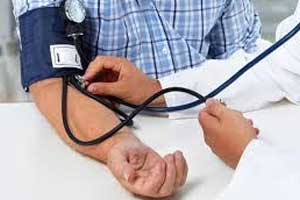- Home
- Editorial
- News
- Practice Guidelines
- Anesthesiology Guidelines
- Cancer Guidelines
- Cardiac Sciences Guidelines
- Critical Care Guidelines
- Dentistry Guidelines
- Dermatology Guidelines
- Diabetes and Endo Guidelines
- Diagnostics Guidelines
- ENT Guidelines
- Featured Practice Guidelines
- Gastroenterology Guidelines
- Geriatrics Guidelines
- Medicine Guidelines
- Nephrology Guidelines
- Neurosciences Guidelines
- Obs and Gynae Guidelines
- Ophthalmology Guidelines
- Orthopaedics Guidelines
- Paediatrics Guidelines
- Psychiatry Guidelines
- Pulmonology Guidelines
- Radiology Guidelines
- Surgery Guidelines
- Urology Guidelines
Around 66% medical students have high BP compared to general public, finds study

Around 66% medical students have high blood pressure as compared to the general public, revealed a study presented at the American Heart Association's Hypertension 2019 Scientific Sessions.
The researchers said that it's unclear why young men would be significantly more prone to high blood pressure than women, however, the stresses of a demanding medical education in addition to anxiety, lack of exercise, lack of sleep and/or poor diet may be contributing factors.
High blood pressure is typically linked with older age, being overweight, smoking and/or being in general poor health. However, this study found that many first- and second-year medical students had abnormal blood pressure levels of which they were unaware, potentially putting them on a path for heart health risks at a younger age. Researchers at Lincoln Memorial University in Harrogate, Tennessee, surveyed 106 male and 105 female medical students whose ages ranged between 21 and 37, with the average age being 25.8 years. The students also provided information about tobacco use, alcohol consumption, diet, exercise habits, mental health, social support and past medical history. Their blood pressure and waistlines were measured for this study.
The study results revealed that:
- More than 16% had elevated or 'pre-high' blood pressure.
- More than 29% had stage 1 high blood pressure, defined by the American College of Cardiology/American Heart Association Task Force on Clinical Practice Guidelines as systolic pressure, the top number, ranging from 130 to 139 mm Hg and/or a diastolic pressure, the bottom number, ranging from 80 to 89 mm Hg.
- Almost 18% had stage 2 high blood pressure (systolic pressure greater than or equal to 140 mm Hg and/or diastolic pressure greater than or equal to 90 mm Hg).
- Male students were more than 13 times more likely to develop elevated blood pressure than females.
- Increasing waist circumference by one inch was associated with an 11% increase in developing stage 2 high blood pressure.
- About 37% of the group had normal blood pressure.
"Elevated blood pressure should not be something that we only associate with being older," said lead study author Jacek Bednarz, Jr., a third-year medical student at Lincoln Memorial University. "Young people lack awareness about their own blood pressure. Getting your blood pressure regularly checked is a simple way to protect one's health."
According to the American Heart Association's "Heart Disease and Stroke Statistics-2019 Update," an estimated 103 million Americans--or about half of all U.S. adults--have high blood pressure, a major public health threat that accounted for 11% of deaths from 2005 to 2015. During the same time period, the number of deaths due to high blood pressure rose by almost 38%.
"While this is a small study, it is interesting. As one of the most common and dangerous risk factors for heart disease and stroke, all people, even those who are young and believed to be in good health, should have their blood pressure checked routinely," said the American Heart Association Chief Science and Medical Officer Mariell Jessup, M.D., FAHA.
Data compiled by the American Heart Association shows approximately 80% of all cardiovascular disease can be prevented by controlling high blood pressure, diabetes and high cholesterol, along with adopting healthy lifestyle behaviors such as not smoking. Positive lifestyle behaviors such as eating healthy foods, regularly engaging in physical activity and maintaining a healthy weight could have the most impact since they contribute to multiple health conditions.
Additional studies are needed to assess the prevalence and heightened risk of high blood pressure in medical students, and the risk factors that lead to it.

Disclaimer: This site is primarily intended for healthcare professionals. Any content/information on this website does not replace the advice of medical and/or health professionals and should not be construed as medical/diagnostic advice/endorsement or prescription. Use of this site is subject to our terms of use, privacy policy, advertisement policy. © 2020 Minerva Medical Treatment Pvt Ltd